Financial gap looms for young Swiss abroad
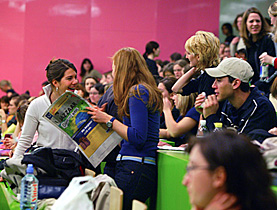
Each year, around 600 young Swiss abroad return home to study, but they are finding it harder to get scholarships, especially if they live in the European Union.
The Association Promoting Education for Young Swiss Abroad says it is the cantons, who are responsible for grants, that are causing financial hardship by implementing new administrative and legal requirements.
Scholarships are becoming harder to come by, according to the association, which advises students returning home to further their education. It says that the cantons are taking a tougher line on documents and certificates that are submitted with a grant request.
But it is also complaining that EU residents aren’t getting a fair deal, a trend that has become noticeable since the implementation of a first series of bilateral accords between Switzerland and the Union in 2002.
This means that Swiss cantons should grant scholarships to EU citizens who are resident in Switzerland, while the opposite is supposed to apply in the EU member states.
For example, a Swiss living in France can make a request to the French authorities, while a French person living in Switzerland can apply to their canton of residence.
Restrictive cantons
But the association says the system is not running as smoothly as it should.
“The problem is not the bilateral accords, but the fact that some cantons are very restrictive when it comes to granting scholarships,” said the association’s president and Green parliamentarian Antonio Hodgers.
“Unlike in the past, they are now refusing to give grants to young Swiss who are EU residents. The fact though is most of the countries where they live don’t provide scholarships to study abroad.”
He adds that according to his own estimates, several hundred people have not received funding since 2002.
Hodgers told swissinfo.ch that although there are a few countries like Germany that will consider grants to study in Switzerland, young Swiss abroad risk being abandoned by the cantons.
The Conference of Cantonal Education Directors says such claims are unfair.
“I feel the system is working well,” the conference’s head of resources, Francis Kaeser, said. “The bilateral accords and the intercantonal agreement on scholarships clearly outline who is responsible for what.”
“The bilateral agreements state that the parents’ country of residence is responsible for scholarships,” he added.
Kaeser admits there are problems with some EU member states, such as France, but points out that young Swiss abroad are also better off applying in more generous countries such as Finland and Sweden than back home.
The association has another concern: cantons Aargau and Thurgau recently tightened the screws, reserving scholarships to residents only.
“Aargau and Thurgau have locked the door,” said Hodgers. “But we are hoping that other cantons will be more generous.”
Financial gap
For Kaeser, the two cantons are only playing by the rules, even if others are prepared to give a little more leeway.
He adds that that scholarships have not been affected by budget restrictions, even though the federal authorities have reduced their contribution to grants since last year.
Before tackling the cantons, the association has already asked the Swiss EU Integration Office, which analyses the EU integration process and its effects on Switzerland, to look into the problem.
“The integration office reached the conclusion that the bilateral accords neither force nor prevent cantons from granting scholarships to Swiss abroad in the EU,” said Hodgers. “Cantons cannot claim that the bilateral agreements make it impossible to give out grants.”
“Today, there are young citizens who receive no support from either Switzerland or their country of residence. They start their tertiary education with an unacceptable financial gap,” he added.
Carole Wälti, swissinfo.ch (Translated from French by Scott Capper)
Each year, around 600 young Swiss abroad come home to study. This number represents an increase of 31 per cent since the 1990/1991 school year.
But they now represent a smaller share of the student body. In 1990, they constituted 11.6 per cent of all students entering Swiss universities from abroad. Today that number is 7.6 per cent.
Most Swiss abroad studying in Switzerland come from France, the United States and Germany.
For more than 40 years, the Association promoting Education for Young Swiss Abroad has been advising young Swiss abroad who return home to pursue their education.
Set up in 1962 by the Foundation for Young Swiss Abroad, the Organisation of the Swiss Abroad and pro juventute foundation, the association helps Swiss abroad apply for grants from their home canton and may itself make additional payments to supplement cantonal grants.
This non-profit body is mainly financed by subsidies from the Federal Culture Office as well as by private donations.
Last year, it processed 811 grant requests, including 363 from Europe, 261 from South America, 70 from Africa, 69 from North America, and 48 from the Asia-Pacific region.
In 2008, the association passed on SFr1.2 million in cantonal grants, to which it added a further SFr80,000.

In compliance with the JTI standards
More: SWI swissinfo.ch certified by the Journalism Trust Initiative
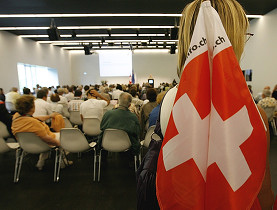
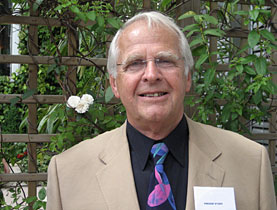
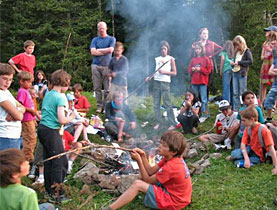
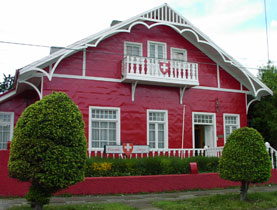

You can find an overview of ongoing debates with our journalists here. Please join us!
If you want to start a conversation about a topic raised in this article or want to report factual errors, email us at english@swissinfo.ch.